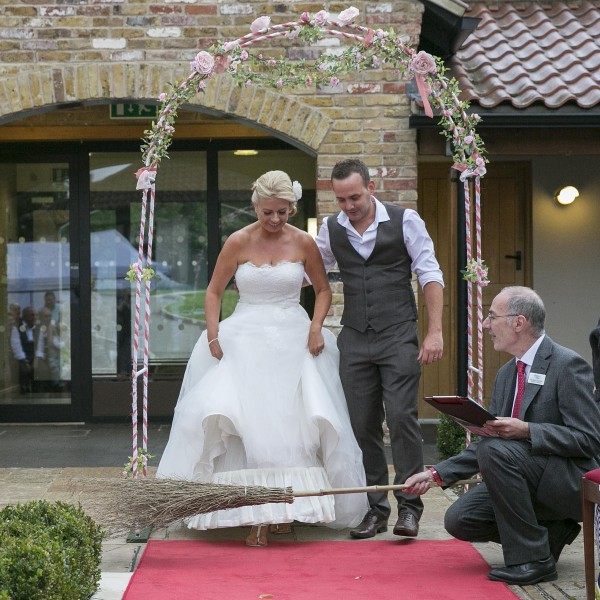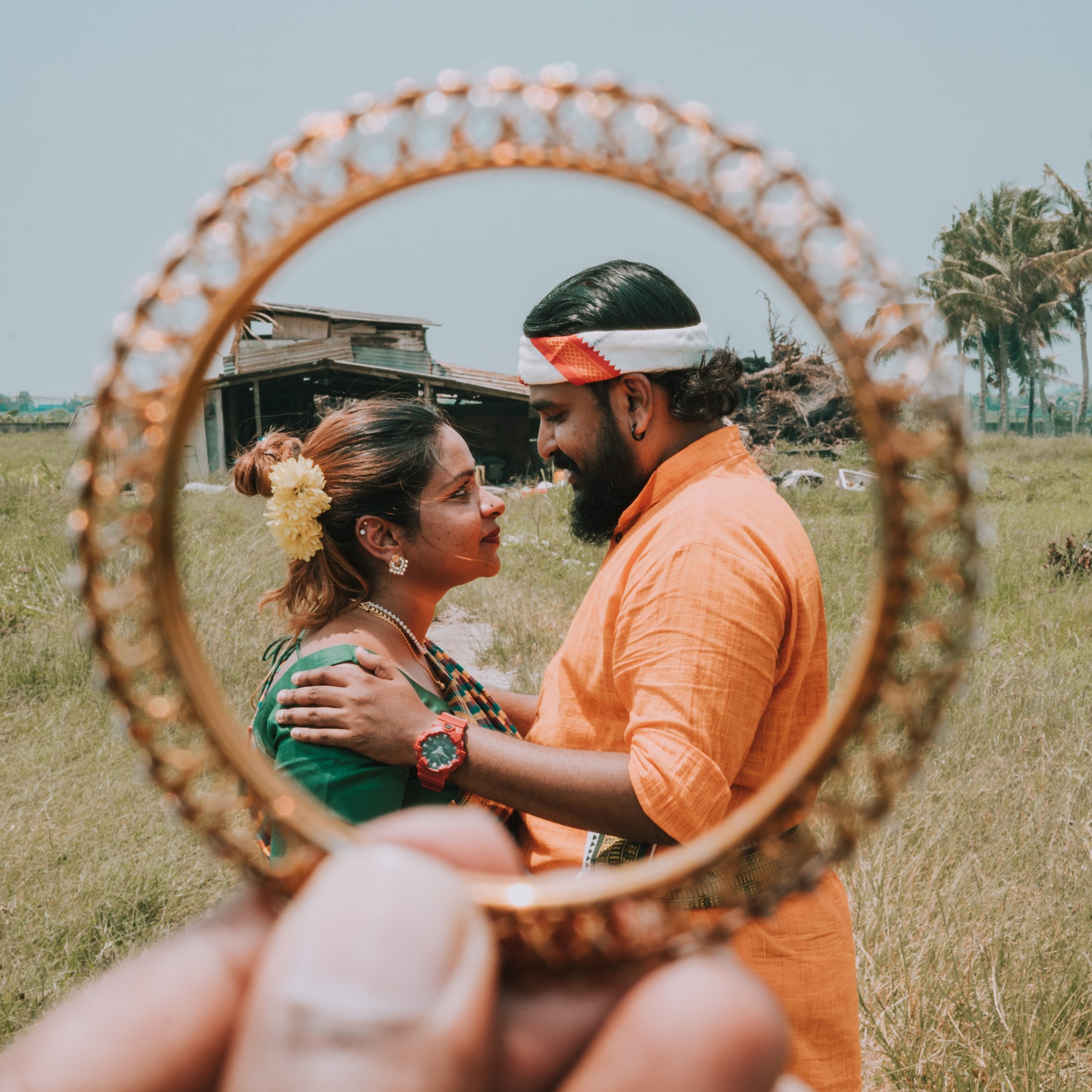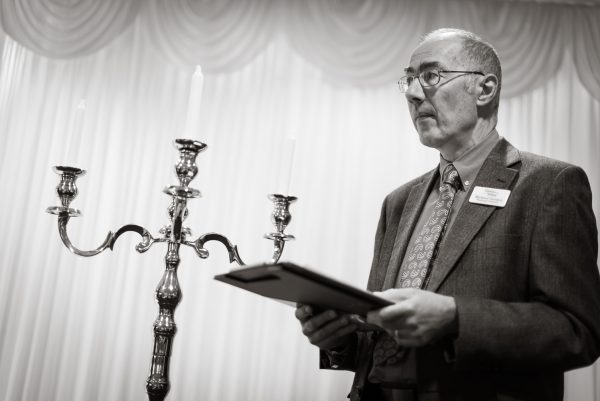
by Michael | Mar 2, 2020 | Blog
I know we’re nowhere near Halloween, but there is always the potential for wedding nightmares!
Wedding Nightmares
How many of these situations would you think I have witnessed as a wedding celebrant?
- A fire
- The groom forgetting the ring
- A fist-fight among guests
- The bride’s car getting lost
- A collapsing staircase
- The groom’s father’s trousers falling down
- A photographer falling over
- The Best Man two hours late because of a job interview
- The bride being too nervous to recite her vows
- The bride’s mother walking out during the Best Man’s speech
You are probably expecting me to say that I have witnessed all of them, but, actually 3, 6, 9 and 10 did not happen on my watch, and 5 happened before the wedding. However, any of these – and many, many more – could have taken place. You might be able to add to the list yourself!
In fact, there’s virtually no limit on what could go wrong. In the vast majority of cases, though, nothing at all will go amiss throughout the entire event.
In fact, most of what does go wrong is not even noticed by most of the attendees.
Solutions
However, it’s natural to worry.
One solution is to use a wedding planner. You pay them to take the burden off your shoulders. And experienced ones are good at improvising solutions.
But what if
you don’t book a wedding planner?
Then it’s
how you prepare – and how you react – that makes the difference.
If you’ve been careful and booked professional suppliers (celebrants, venue, florists, DJs, photographers, make-up artists, caterers, the bridal car, and so on), then you should be OK. It wouldn’t do any harm, though, to ring round the week before the wedding and make sure they do have your reservation in their books! There may be some last-minute (mutual) questions too.
Good for
your peace of mind, at the very least – and suppliers are human too!.
On the day, use your checklist (you are making lists, haven’t you?!) and start early. If you have briefed your team properly, everyone will know what they are meant to be doing, where and when.
And if something does go wrong, goodwill normally rides to the rescue. Your team will almost certainly rally round, and help sort out the problem. And if the worst comes to the worst, your family and friends will surely show understanding and tolerance. Things do go wrong, after all, in life’s rich tapestry. If people see that efforts have been made to sort out the issue, then the criticism will probably be nothing stronger than a few tuts.
So relax and
enjoy your big day, secure in the knowledge that you have prepared well and
have a fine team on side. Then everything will flow and you’ll have an
unforgettable day – for the right reasons!

by Michael | Feb 16, 2020 | Blog
One of the most important decisions relating to your wedding concerns the venue. The first thing to realise is that you can’t leave it to the last moment! For one thing, the venue of your choice may well be booked up a year ahead, or even more.
Unless you
already know for sure where you want to be, you will have to do some research.
Starting off
You may be
guided by the experiences of acquaintances. If they liked a place, it doesn’t
mean that you will, but you can visit and see what you think.
You may have
a passion that dictates where you’ll go. One ceremony I conducted was set in
the open air at a Canal Centre (albeit, on dry land!) – the couple were
passionate about longboat holidays, so it made perfect sense.
Otherwise,
you’ll probably start looking at geographical areas that suit you.
The process
You’ll can narrow
the process down by looking at websites. Obviously, that’ll give you some basic
information, but a visit is virtually indispensable. That way, you can get a
feel for the atmosphere and beauty of the place (essential before you make your
decision). You should also make an appointment with the events planner, and
come with a list of questions.
Incidentally,
before you visit, check the venues actually have availability for your intended
date.
The big mistake
When you’re choosing your suppliers – be they florists, civil celebrants, wedding planners, musicians, photographers, or whatever – don’t go for the cheapest! Obviously, you have to respect your budget, that’s a given. But you want to go with a supplier that you feel you can trust and whom you want to work with. That may come at a cost, and you may need to try and make savings somewhere else.
The visit
When you go
to venues, you will need to consider not only the surroundings, but also the
event planner. Hopefully, you will like them and they’ll be sympathetic to your
vision.
Ask them
what you need to know. This may range from capacity to catering, from whether
the whole building is included in the hire to whether the planner will be on
hand on the day, from décor to logistics (like parking or microphones), and so
on.
If you find
a venue you love (not “like”!), go for it. If you need to cut a few corners, you
can often negotiate a discount depending when you hold the event.
It’s cheaper
to book a venue out of (summer) season (or Xmas and Valentine’s Day) and to
avoid Saturdays or Fridays. Afternoon, rather than evening, can be cheaper.
So go to
several venues (with the same questions), and you can compare.
It sounds
like a lot of “homework”, but it’s your big day, and it’s important to get it
right!
Feel free to
call me to discuss any of this further.

by Michael | Feb 6, 2020 | Blog
Valentine’s
Day is a popular day for a wedding – popular, at least, until you become aware
how expensive it is likely to be! Wedding venues hoist their prices for special,
extra-romantic days. So be warned!
Talking of
raised prices, try taking your beloved out for a restaurant meal on 14th
February!
Looking from
a less mercenary angle, Valentine’s Day is even more popular for proposals. And
they don’t have to cost a thing!
Valentine’s Day has been around a couple of thousand years. It wasn’t
called this originally, but was known as Lupercalia. It was a Roman festival
held in mid-February. The idea was to celebrate the coming of spring, and it
included fertility rites and the pairing off of women with men by lottery.
The story (as researched by Mark Merrill http://www.markmerrill.com/the-real-story-behind-valentines-day/) concerned a cruel 3rd century Roman Emperor called Claudius II Gothicus. He spent a lot of his time fighting wars, and he soon had an issue recruiting soldiers.
Claudius assumed that the reason for the reluctance to sign up was because Roman men did not want to leave their loved ones or families behind. He therefore cancelled all marriages and engagements in Rome!
The only person to stand up against this decree was, surprisingly enough, a Christian priest called Valentine. He began secretly to marry soldiers before they went off to war.
The Emperor eventually found out and imprisoned Valentine, sentencing him to death.
Before his execution, Valentine met and fell in love with a blind girl, the daughter of his jailer. On his last evening, Valentine, who had no writing instruments available, is supposed to have written her a sonnet in ink squeezed from violets. These words are said to have restored the girl’s eyesight.
There was no
happy ending for Valentine, as he was killed the next day. However, he had
given his life so that young couples could be married.
At the end of the 5th century, Pope Gelasius I made the festival a lot more respectable and replaced Lupercalia with Valentine’s Day.
Eventually, Valentine was canonised by the Catholic Church, and February 14th was chosen as his saint’s day. On that day birds (especially lovebirds, but also owls and doves) are supposed to begin to mate.
If you’re thinking of popping the question next Valentine’s Day, I hope you get the answer you’re looking for. And if you do, feel free to have a word with me for a few ideas about how you can celebrate a personalised wedding.
by Michael | Feb 3, 2020 | Blog
I’m delighted to welcome another guest to write for this blog. This time it’s Chloe Walker. She describes herself as:
“a
twenty-something year old, freelance writer who’s focusing on wedding and event
planning. When she isn’t thinking about her very own dream wedding, she
can be found curled up by the fire with her dog, Bruce.”
Enjoy
her thoughts!
Wedding-day amnesia affects a surprising number of newly married couples.
According to a survey from Sony, “More than 1 in 4 [married couples] admit to not remembering their wedding vows”
Many couples say that their special day has become just ‘a big blur’ and that they’ve forgotten all the finer details, even if everything was utterly perfect and the day itself was an emotional and exciting experience.
It’s hardly surprising that this happens. Weddings can be stressful and the day itself can often feel busy and even chaotic, even if you’ve carefully planned every detail and are head over heels in love with your partner.
But there is good
news.
You can prevent wedding amnesia from rearing its ugly head
and allow yourself to cherish the memories for ever. Here are six ways you can
do just that.
1.
Choose the right venue
Your wedding venue can make your wedding memorable for all
the right reasons, or all of the wrong ones. That’s why it’s vitally important
to get it right.
Make sure it feels
like the venue of your dreams and offers everything you hoped it would. Let
your heart guide you when making your decision here- that’s what will truly
make the day feel memorable.
Opt for something that helps the two of you make the most of
your big day and feel special, not something that you feel pressured into
choosing by family or friends.
The venue should also give you the opportunity to relax and
enjoy the venue and surroundings, your guests should feel comfortable and it
should provide a sense of intimacy that helps you form those special memories
that you can share with your grandkids.
Finally, ensure that you have full privacy on your big day
and don’t have to share with anyone else.
Luxury wedding venue, Manor by the Lake say it best; “ The last thing you want is to see random people you don’t know wandering around your venue on your wedding day!”
2. Step away for a moment or two
On your wedding day, make sure that you find time to break
away from the stress and busyness of the occasion and really enjoy the moment.
This will help ensure that your nerves don’t get frazzled
and you have enough energy to make it through the day, and help your brain form
those memories that will last a lifetime.
Stop what you’re doing, close your eyes (if you can) and
take some slow deep breaths. Aim to make your exhales longer than your inhales
to help you feel a deep sense of calm.
As you do this, soak up your beautiful surroundings, your
gorgeous dress and the exciting event as a whole, then go back to enjoy the
celebrations feeling refreshed.
3.
Connect and reflect before you walk down the aisle
Just before the ceremony itself starts, take time to sit and
reflect. Be quiet and sit for five minutes or so. Bring to mind memories from
your relationship so far and soak up the moment.
If you can, sit with your partner, hold hands and enjoy this
sense of deep connection and union before you get married. Doing this will help
you escape from the organisational chaos that has led up to the event and you
can reconnect with your loved one.
4.
Enjoy a short walk after the ceremony
Instead of finishing the ceremony and rushing off for
photographs or to the reception, get outside into nature and take a short walk.
Even 15 minutes will be enough for you to reconnect with your partner and
absorb the exciting fact that you’re now a married couple!
This also provides a great opportunity for your wedding photographer to snap
some beautiful, scenic shots that you can enjoy for the rest of your lives.
5.
Eat together
When you’re trying to talk to everyone and have so much to
do, you might find yourself forgetting to eat at your own reception. Don’t make
this mistake! You’ll only find your stomach grumbling and your stress hormones
going through the roof!
Just take five minutes with your partner, grab a plate and
fill it with as much food as you like. Then sit and enjoy it together,
uninterrupted. You’ll build beautiful memories, feel better and have enough
energy to make it through the day too.
6.
Write it all down
Prevent your wedding day memories fading away by writing
down everything that happened on your special day as soon as you can.
This will create a vivid record of your wedding day that you
can refer back to whenever you want. When you have it down on paper, you’ll
stand a far better chance of remembering those tiny details like conversations,
expressions and events that you loved so much on the day and really bring those
memories back to life.
If you’re not a fan of writing, you can always record your
memories digitally using the voice recorder app on your smartphone. Just be
sure to back it up afterwards for safekeeping.
Final
thoughts
Even though you’ve likely poured months or even years into
planning your wedding, it can all go by in a flash.
That’s why you should do your best to preserve those
memories and cherish them forever.
Choose your dream venue, take moments through the day to
soak it all up and enjoy the occasion. Then you stand a better chance of
avoiding wedding day amnesia and of remembering it all.
If you want to contact Chloe, her e-mail address is chloe.walker@harbourmail.co.uk.
Photo: Matt Penberthy

by Michael | Jan 20, 2020 | Blog
You’re getting married? Brilliant! Have you decided who will officiate? Will it be a priest (or equivalent), a registrar or a civil celebrant? Did you even realise that you have a choice?!
[This post is designed for English or Welsh couples, although laws are set to change in the not-too-distant future. Separate rules apply to Scotland and Ireland.]
Religion
If you are
marrying in an Anglican church, this is as simple as it gets. You will be able
to combine religious and legal in one ceremony. The same applies for Jewish and
Quaker weddings.
Otherwise,
you will have to arrange a trip to the register office and to the church before
you can be declared married.
Registrars
The registrars come at the other end of the spectrum to priests, although both services are pretty much standardised. The registrars are not permitted even to mention God or religion. What they do, however, is to pronounce the legal words. Without these being uttered and witnessed, no marriage is valid.
You need to make an appointment with the registrars and go to their office with two witnesses. Or the registrars may come to the venue of your choice (currently, there are restrictions, such as a minimum requirement of four solid walls). Be aware that this will cost you substantially more.
The registrars will offer you a minimum of choice as to the service structure. And their presentation skills can vary wildly!
Celebrants
Until the law changes, civil celebrants cannot marry people legally. They can bless them, conduct a part-religious (or even wholly-religious) service, hand-fast them, get them to sign a marriage certificate afterwards, but none of this makes the marriage legal.
So what
normally happens in these cases is that the couple marries first (at the register
office, unless the registrars come out to their venue). This can be done in a
private room or in front of guests.
When the registrars have left, the civil celebrant can stand up and publicly conduct the personalised ceremony the couple have been dreaming of. It may be religious, or partly so; it may be (partly) humorous; it may contain ritual; active participation may be invited; favourite readings or music may be chosen; it may well be unique to the couple.
At the end, the celebrant may declare the couple legally married (as long as the registrar service has been completed!).
The point is that, by using a celebrant, you have free choice as to the tone and content of your ceremony on your big day.
If you want
any further clarification on this issue, please feel free to contact me.




